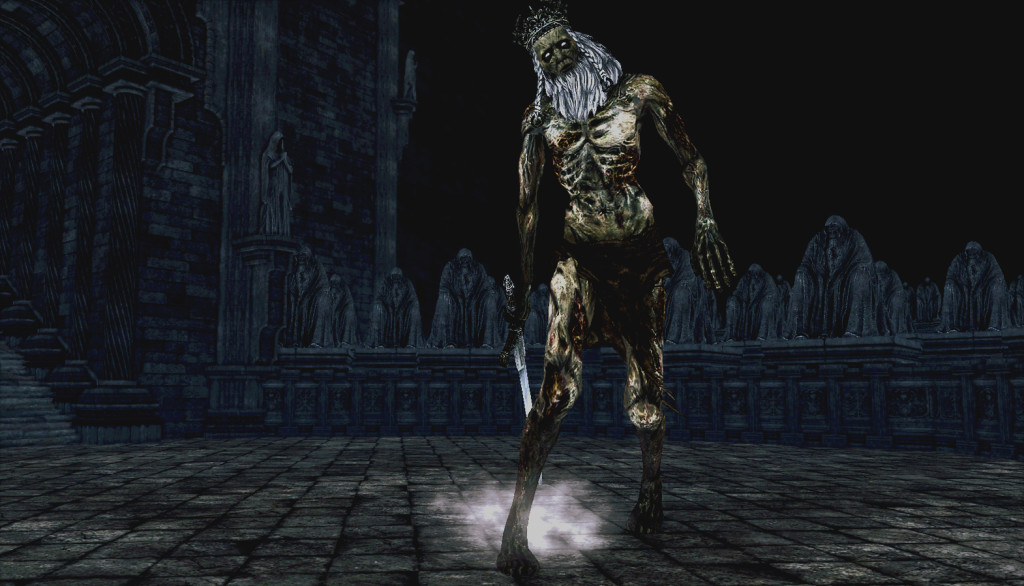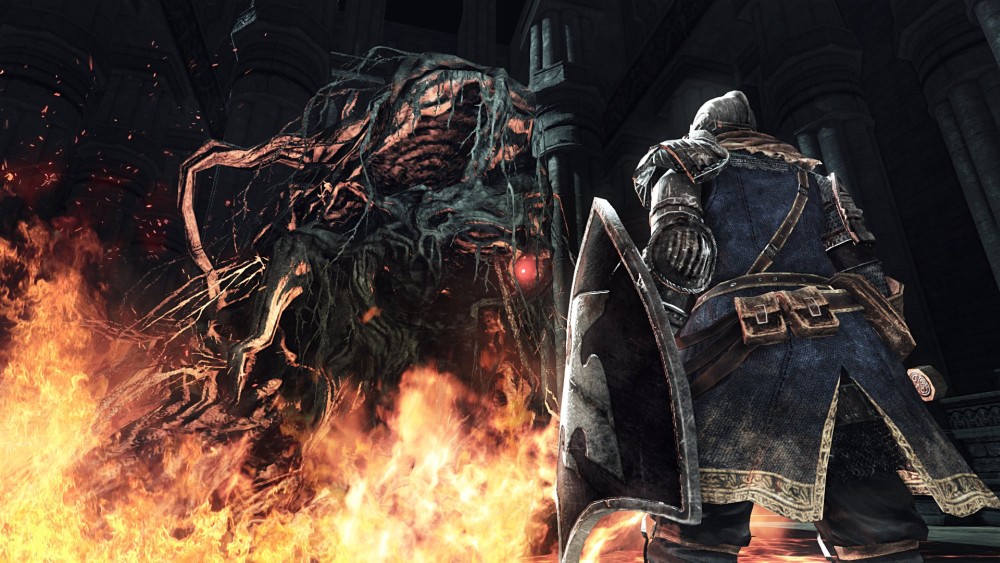I am unsure why, but this playthrough of Dark Souls II: Scholar of the First Sin seems much, much more enjoyable than the first. And no, it has nothing to do with the new content, so far (as of right now, I just hit the Undead Crypt, so I’m pretty close to doing the DLC). Rather, I’m reminded why I really, really like video games, and how the circumstances surrounding a video game can often determine how much you enjoy it.
NOTE: SPOILERS below, but you probably already knew that. These games are so cryptic that I doubt most people would pick up on it unless they read it on a wiki anyway!
Hype is a terrible destroyer of fun. I played Dark Souls on the PC a few months before Dark Souls II came out. I love Dark Souls, a lot, for a lot of reasons (a big, 10,000 word article sits in the Theology Gaming archives, just waiting for my approval). Unfortunately, Dark Souls II suffered a strange development cycle and two new co-directors; they changed many of the things I enjoyed about the first game, to the second game’s detriment in a number of respects. That said, I was HYPED for Dark Souls II after finishing Miyazaki’s masterpiece, and that direct comparison inevitably destroyed my enjoyment of the game (as was my need to rush through it).
I guess you could say the game made me a little angry upon playing it. It simply wasn’t Dark Souls, at least in my opinion. There seemed no difficulty to it, and I honestly didn’t understand how such a dip in quality could occur. Such a direct comparison makes it difficult to see the good qualities in the new game, versus the old one.
With two years of time and distance, I’ve grown to appreciate Drangleic as an brilliant aesthetic choice. Rather than the complete and utter darkness of Dark Souls’ Lordran (the flame burns out), Drangleic strikes a chord of the forgotten and the decrepit, with places that seem worn more by time than by some exterior magical force. It’s hard to cite the exact difference here, but the remnants of a kingdom made by human beings (rather than the gods) makes for a different, yet no less interesting, setting. I like to compare it in a positive way to Devil May Cry 2’s washed out Mediterranean cities, which is a setting we really don’t see enough of. I like the fact that there’s so many knights around, even if Strike damage blows them up; it’s unerringly consistent with the lore and setting…
 Which, as I found out, relates to the lore of the first Dark Souls much more closely than I imagined. So many hints I missed the first time now pop up in my head, from the owners of the Great Souls being descendants of the Lordvessel bosses in the first game to the fact that Drangelic is (literally) built on top of Lordran. It’s a world created by a man, King Vendrick, who wants to stop the curse of the Undead by any means except using the Bonfire; the best of intentions, unfortunately, can wreck everyone and everything, especially if a woman from a “foreign land” (i.e., the Abyss) tells you to invade a land of Giants. The plot, of course, follows the similar tragic arc of the first game, but when you realize the people involved weren’t trying to prolong a dying age but to save everyone instead, things take on a very sympathetic tone.
Which, as I found out, relates to the lore of the first Dark Souls much more closely than I imagined. So many hints I missed the first time now pop up in my head, from the owners of the Great Souls being descendants of the Lordvessel bosses in the first game to the fact that Drangelic is (literally) built on top of Lordran. It’s a world created by a man, King Vendrick, who wants to stop the curse of the Undead by any means except using the Bonfire; the best of intentions, unfortunately, can wreck everyone and everything, especially if a woman from a “foreign land” (i.e., the Abyss) tells you to invade a land of Giants. The plot, of course, follows the similar tragic arc of the first game, but when you realize the people involved weren’t trying to prolong a dying age but to save everyone instead, things take on a very sympathetic tone.
What helps sell these kinds of plot threads, surprisingly, rests in the “inverse” order of the level design. Dark Souls II lets you freely choose your path (to a degree), with surprisingly little in the way of breaking the beginner sequence order. Just for example, I beat The Lost Sinner first, out of the four paths open to the player, and that certainly surprised me. Skill trumps levels, after all! However, once you finish the four paths to obtain the four Great Souls, seeing the devastation wrought by years of neglect and forgotten memories, the game railroads you on a singular path to see the legacy of the two people who sought to save the kingdom: King Vendrick, and Aldia, his crazy-professor brother (and the Scholar of the First Sin, far as I can guess).
One locked himself away to prevent Nashandra from forcing a new bonfire sacrifice, and the other brought dragons back to life, but both succumbed in the end. Both fight back against fate, which inevitably destroys them. More than anything else, I want to say that design seems intentional the more I think about it (the new game sheds a lot of light on this). And, honestly, I completely missed any of this the first time, but I grow to like Dark Souls II almost purely on these lore reasons.

The game, for the most part, plays exactly the same, excepting all sorts of changes in enemy composition, and some minor changes in loot locations. The level design remains the same in many respects, with the same bizarre inconsistencies (like Iron Keep being above Earthen Peak, which makes no logical sense), and the same annoying issues (seriously, rolling and the ADP stat still feels unnecessary).
I could complain about all this, but I won’t. The larger groups of enemies now force much more patience from the player, and this actually helps make the game much more like its predecessor. Last time, I rushed through (due to the original release’s ease), and this time I’m savoring it; that slow pace revealed some things I wouldn’t find otherwise. The game’s new density forces you to play a patient game of observation, and I kinda love it!
Honestly, the last thing I thought I would be playing in 2016 was Dark Souls II, but here we are! My lack of patience the first time really crushed the experience for me. Souls games, let’s be honest, almost entirely consist of patience, both tense and not, to explore a big world and hopefully not die a lot. Like God, sometimes you need to be patient, to wait and to observe in order to understand. That’s a lesson I think we could all use, both in video games and in life.
Be still before the Lord and wait patiently for him;
fret not yourself over the one who prospers in his way,
over the man who carries out evil devices!
8 Refrain from anger, and forsake wrath!
Fret not yourself; it tends only to evil.
9 For the evildoers shall be cut off,
but those who wait for the Lord shall inherit the land.Psalm 37:7-9
